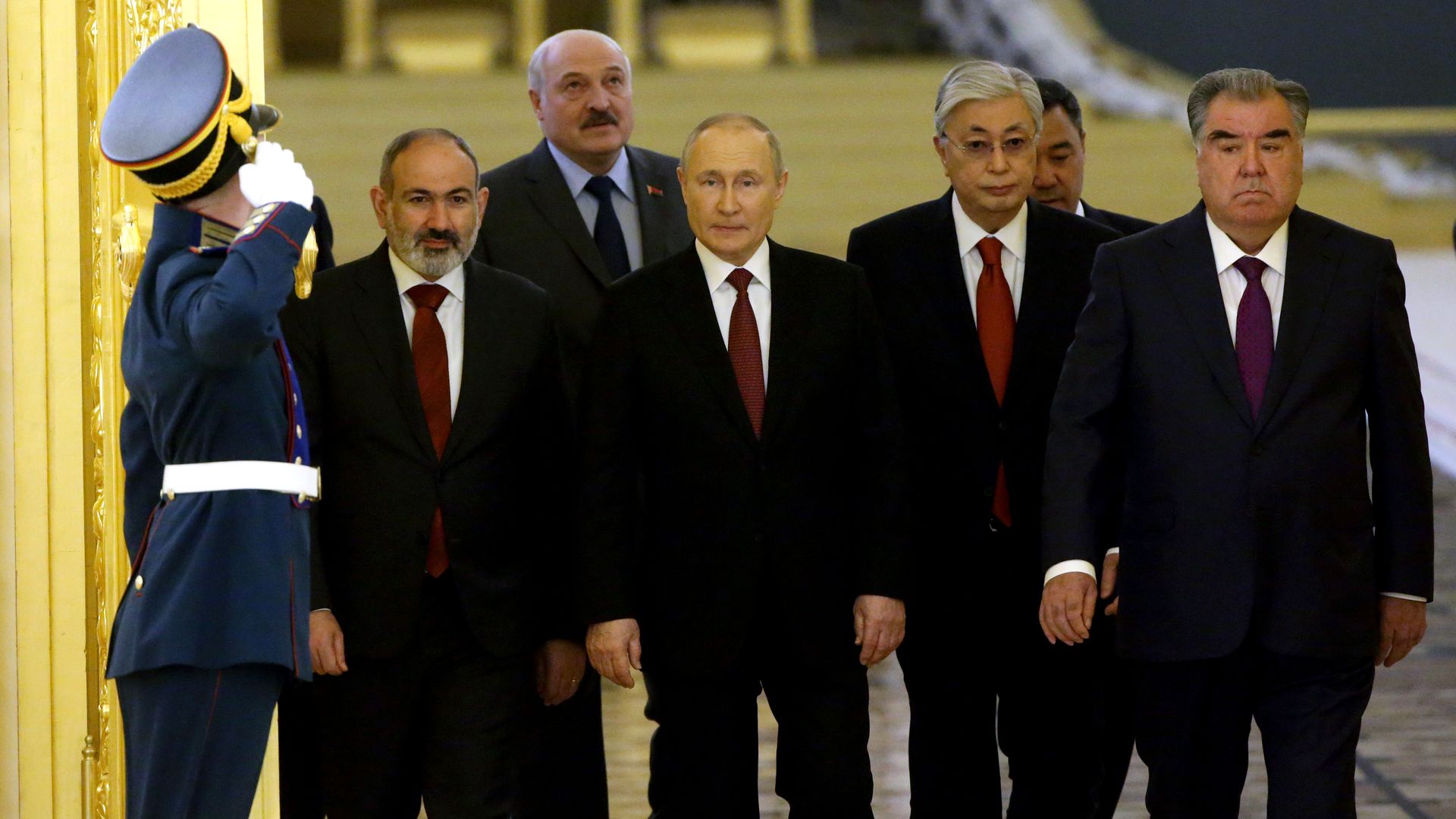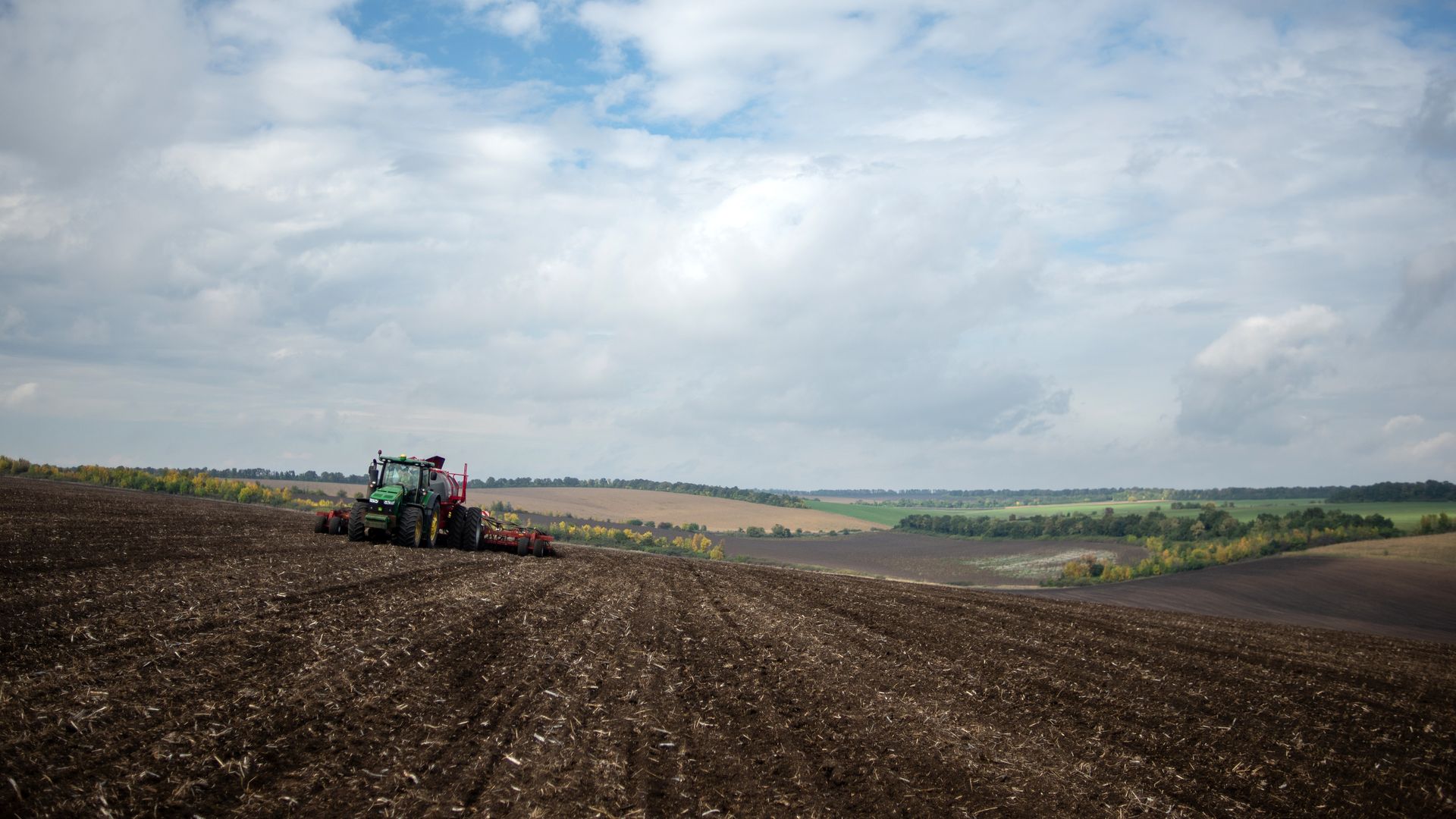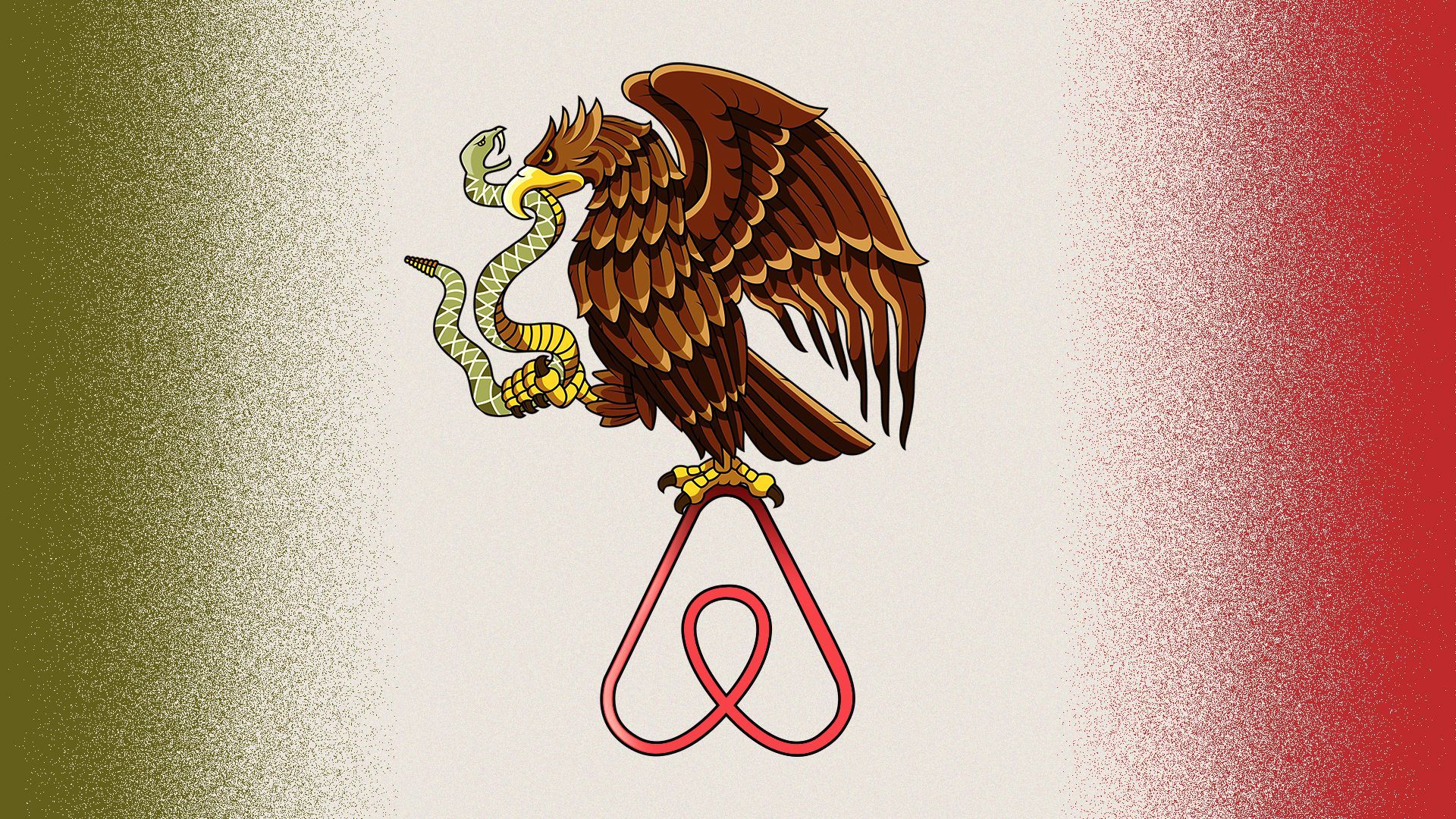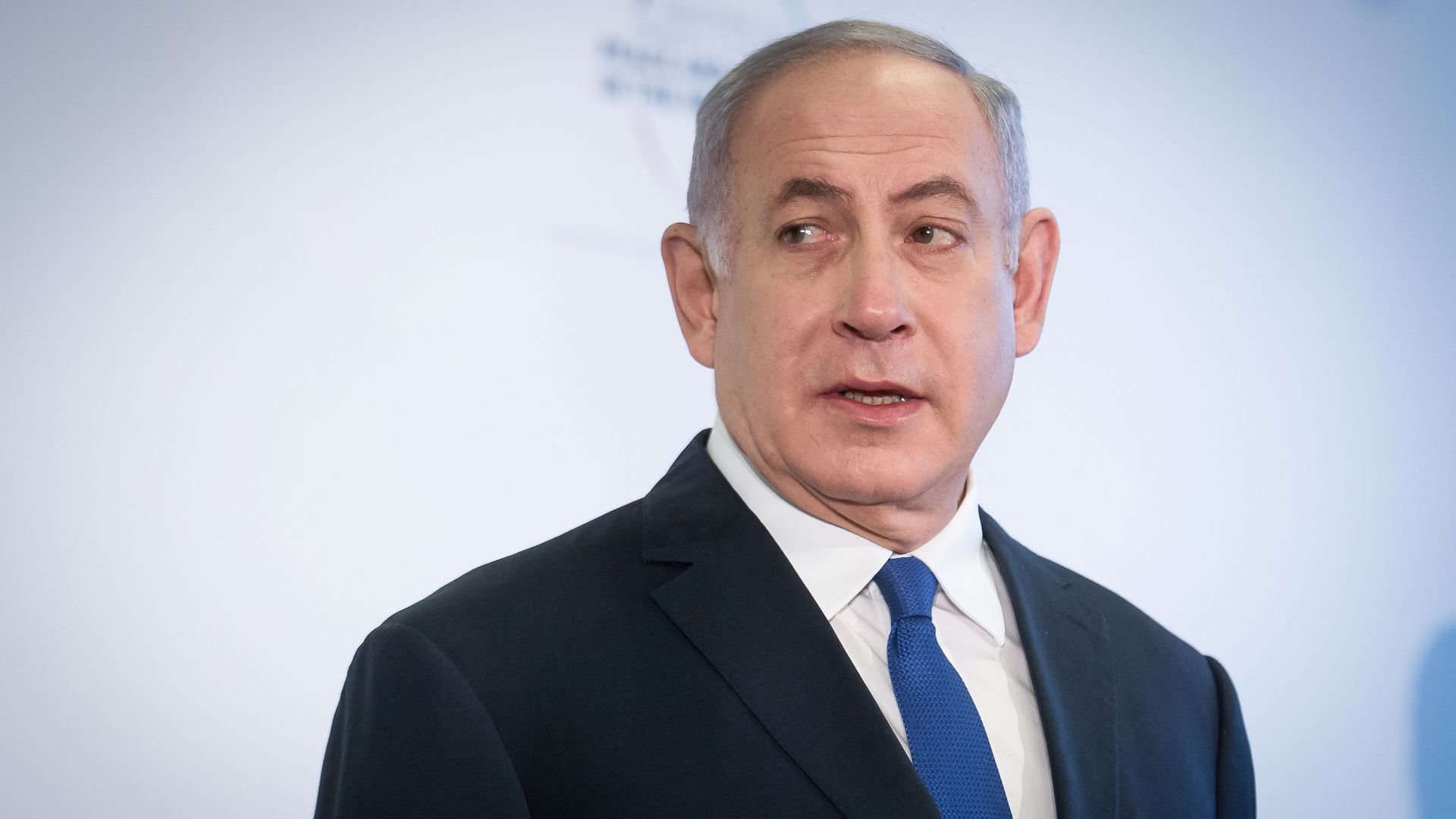| | | | | | | Presented By Babbel | | | | Axios World | | By Dave Lawler · Nov 17, 2022 | | Welcome back to Axios World. - We're kicking off tonight (1,805 words, 7 minutes) in Kazakhstan, booking an Airbnb in Mexico City, and gearing up for the World Cup. Thank you for reading.
| | | | | | 1 big thing: Russia's shrinking sphere of influence |  | | | Russian President Vladimir Putin (center) and the leaders of his CSTO allies at the Kremlin in May. From left: Armenia's Nikol Pashinyan; Belarus' Alexsandr Lukashenko (back row); Putin, Kazakhstan's Kassym-Jomart Tokayev; Kyrgyzstan's Sadyr Japarov (back right) and Tajikistan's Emomali Rahmon. Photo: Getty Images. | | | | One of Russia's most prominent TV hosts fumed this week at what he saw as an act of defiance from allies in the Collective Security Treaty Organization, Russia's answer to NATO. Driving the news: While Belarus voted against a UN resolution calling on Russia to pay Ukraine war reparations, Russia's other four treaty allies — Armenia, Kazakhstan, Kyrgyzstan and Tajikistan — all abstained. - "NATO countries have all lined up, looking at [President] Biden with adoring eyes," TV host Vladimir Solovyov lamented. "What do we have?"
The big picture: Central Asian countries have cautiously distanced themselves from Moscow since the invasion of Ukraine. - At recent regional summits, Tajik President Emomali Rahmon demanded more "respect," and Kyrgyz President Sadyr Japarov kept Vladimir Putin waiting before a meeting, Nikkei Asia reports.
- But nowhere is the shift more notable than in Kazakhstan, which shares the second-longest land border with Russia and has retained close links with Moscow since the collapse of the USSR.
Meanwhile: Kazakh President Kassym-Jomart Tokayev, who is expected to win a new seven-year term in elections this weekend, has repeatedly refused to back Russia's invasion. - In June, he went so far as to declare — while sharing a stage with Putin — that Kazakhstan respected "territorial integrity" and would not follow Russia in recognizing the independence of Luhansk and Donetsk in eastern Ukraine.
- Kazakhstan canceled a parade in May marking the Soviet victory over the Nazis, officially for budget reasons. Astana also banned military symbols like the "Z" displayed by backers of the invasion.
The other side: Another Russian TV host, Tigran Keosayan, fumed after those moves that if Kazakhstan thought it could "get away" with such "ingratitude," it should "look at what is happening in Ukraine." Senior politicians have made similar statements. - In June, a Russian court ordered the pipeline through which 80% of Kazakhstan's oil exports flow to the Black Sea to halt operations due to the risk of spills — though many speculated the true reason was to remind Kazakhstan of its reliance on Russia. The order was soon reversed.
State of play: Kazakhstan is working to diversify its export routes and has hosted the presidents of China, Turkey and the European Council all in the past two months — a sign that the world's 10th largest oil exporter has options. - "In order to continue to attract foreign direct investment, it is crucial that Kazakhstan not be lumped together with Russia," Annette Bohr, a Eurasia analyst at Chatham House, said at a recent panel discussion.
- The Ukraine invasion also sparked fears in the general public that Kazakhstan could be next, added Bhavna Dave, a Central Asia expert at the University of London. Just this week, a concert in Almaty by Russian singer Polina Gagarina was canceled after online protests over her support for the war.
A senior Kazakh official told Reuters that if Tokayev wins easily on Sunday, he could further distance himself from Moscow. - That's a remarkable turn of events less than a year after Russia sent troops to help Tokayev put down a violent uprising.
- Yes, but: Kazakhstan and other countries in Central Asia are still heavily reliant on Russia. Around 40% of the food and clothing sold in Kazakhstan comes from Russia, and the Kremlin can still hold Kazakhstan's energy exports hostage, notes the Carnegie Endowment's Temur Umarov.
Zoom out: The UN vote that infuriated Solovyov also underscored that Russia has partners far beyond the post-Soviet space. China voted with Russia, as did Iran and North Korea, which are reportedly providing weapons for Russia's war effort. - Among the other yes votes were five African countries, including two — Central African Republic and Mali — that are hosting Russian mercenaries.
|     | | | | | | 2. Deal reached to keep Ukraine's grain corridor open |  | | | Planting the 2023 wheat harvest in Odessa Oblast. Photo: Julia Kochetova/Bloomberg via Getty Images | | | | The "grain corridor" keeping three of Ukraine's Black Sea ports open was extended for 120 days today. Why it matters: The prospect of the deal lapsing sparked fresh concerns for global food security and for Ukraine's economy, roughly one-fifth of which is based on agriculture. - Before the war, 90% of exports flowed via the Black Sea.
- After Russia blockaded those ports, farmers had to scramble to sell even a portion of their harvests.
Zoom in: Kees Huizinga, who owns a 15,000 hectare farm in central Ukraine, says the cost of exporting via the Black Sea is double what it was before the war, but it's still the cheapest option by far. - After the invasion, he attempted to truck wheat and corn to Romania for export there. That process took four months, he says, and some farmers weren't able to get theirs out at all.
- The land routes pose huge logistical challenges — Ukraine's rail gauge is wider than the European one, for example — and Poland and Romania don't have enough capacity to handle all the additional grain.
- Huizinga estimates that if the grain corridor remains open, farmers like him will be able to sell about 70% of next year's harvest. If it closes, that will fall to less than 50%.
The bottom line: "We already put things in the soil in August. We'll only harvest it in July. We don't know what the yield is going to be, we don't know what the price is going to be, that's the normal situation. But now we don't know if we can sell it or not," he says. - "So we're all hoping the Russians will have left by next harvest."
|     | | | | | | 3. Global news roundup |  | | | People displaced by the fighting in eastern DRC flee to the city of Goma. Photo: Alexis Huguet/AFP via Getty Images | | | | 1. Three men with links to Russia were convicted in a Dutch court today over the 2014 downing of Malaysia Airlines flight MH17 above rebel-held eastern Ukraine that killed all 298 people on board. 2. Ethiopia's Tigray region received its first international aid deliveries this week since the government and rebel forces agreed to end the fighting. 3. Brazilian President-elect Luiz Inácio Lula da Silva declared this week at the COP27 summit that "Brazil is back" in the global fight against climate change, Axios Andrew Freedman writes. - Why it matters: Outgoing President Jair Bolsonaro spurned the UN process and drove up Amazon deforestation.
Elections to watch: - Malaysia: Opposition leader Anwar Ibrahim on Saturday is looking to finally fulfill his two-decade-long dream of becoming prime minister. But he's facing what is shaping up to be a tight race with Prime Minister Ismail Sabri Yaakob of the once-dominant and now-resurgent UMNO party and former premier Muhyiddin Yassin.
- Nepal: Voters head to the polls to vote in national and provincial elections on Sunday amid soaring inflation. The election is being billed by many as a contest between the country's "traditional parties and a new crop of young politicians," Al Jazeera writes.
- Equatorial Guinea: The world's longest-serving president, Teodoro Obiang Nguema, is expected to extend his 43-year authoritarian rule in elections on Sunday.
|     | | | | | | A message from Babbel | | Polish up your Polish — or 13 other languages | | |  | | | | Not only can you learn to say "dziękuję ci" ("thank you" in Polish!) with Babbel, but it also helps get your pronunciation right from the start. A language learning platform developed by 150 linguists, Babbel has lessons, exercises, videos and more. Speak a new language in as little as three weeks. | | | | | | Bonus: World's greatest tournament begins |  Data: FIFA; Map: Thomas Oide/Axios The World Cup kicks off on Sunday with host nation Qatar squaring off against Ecuador. - My money is on a South American winner after two decades of European dominance. Brazil and Argentina are the favorites, along with France, but I like the look of Uruguay as well.
You're probably aware of the controversy around awarding the tournament to a tiny, gas-rich kingdom with no real soccer pedigree, a climate so hot they had to reschedule for winter, and a workforce of vulnerable migrant laborers building the stadiums. |     | | | | | | 4. Mexico City's Airbnb bet ruffles residents |  | | | Illustration: Allie Carl/Axios | | | | Mexico City is betting big on digital nomads despite concerns that they're driving up rental costs and pricing out locals, Axios Latino's Marina E. Franco reports from the Mexican capital. State of play: A record number of Americans have migrated to Mexico since the pandemic began, many of them to work remotely due to the lower cost of living. - Airbnb has seen a 30% increase in long-term rentals in Mexico City since 2019, the company says. That's helping to drive up rents in some of the city's trendiest areas.
- Airbnb and Mexico City signed an agreement last month that facilitates work-from-home tourism, which the local government promises will bring in $1.4 billion a year and trickle down to local residents.
- But tenants' rights organizations and renters say the agreement will further raise rents and segregate the city by forcing out renters who can't afford higher costs, especially the elderly, Indigenous people and young adults.
|     | | | | | | 5. Bibi's push for power to override Supreme Court |  | | | Photo: Mateusz Wlodarczyk/NurPhoto via Getty Images | | | | Incoming Israeli Prime Minister Benjamin Netanyahu has agreed during ongoing coalition talks to commit to passing a law that would allow the government to bypass Supreme Court rulings, Axios' Barak Ravid reports. Why it matters: Such a law could significantly erode the court's independence and its ability to block laws or government decisions it deems unconstitutional or in violation of human rights, particularly if the law requires only a simple majority to override the court. - The proposal's main backers are ultra-Orthodox and extreme-right members of Netanyahu's bloc, but it could also potentially give Netanyahu more leeway to undercut his own corruption trial.
- Go deeper..
More from my Axios colleagues: |     | | | | | | 6. What I'm reading: "Between Two Fires" |  | | | Evening in Moscow. Photo: Sefa Karacan/Anadolu Agency via Getty Images | | | | I picked up New Yorker writer Joshua Yaffa's 2020 book "Between Two Fires" a couple years late, but it's been a helpful companion as I write and think about how Russians are responding to the invasion of Ukraine. Yaffa examines how people who are ambitious, often well-meaning and sometimes even heroic make compromises to succeed in Putin's Russia. - The Chechen human rights activist who collaborates with a vicious regime so she can continue her work, for example, or the high-minded filmmaker who improbably becomes the head of Russia's largest TV channel — and helps create the cult of Putin.
- These individuals know they can't truly change the state, let alone topple it, and that their lives will be easier and more successful if they play along.
- Yaffa suggests such implicit calculations are being made all across Russia. But he ends by pondering whether the new, harsher version of Putinism — more nationalistic, less flexible — has started dividing the country into true believers and genuine dissidents.
|     | | | | | | 7. Stories we're watching |  | | | Cheering on Pakistan's cricket team in the T20 World Cup final at a mall in Karachi. Photo: Betsy Joles/Getty Images | | | - Poland, NATO say deadly explosion likely caused by Ukraine air defense
- Cop 27: $20 billion plan to wean Indonesia off coal; Deep fault lines remain in negotiations
- G20: Stopping US-China free fall; Ukraine tensions dominate
- North Korea fires ballistic missile after warning to U.S.
- China's plan to support housing lifts stocks
- Nuclear watchdog presses Iran over undeclared sites
- U.S. tells Iraq it won't work with officials linked to terror groups
Quoted: "We will be number one five years from now, 10 years from now, and 50 years from now. We are not going to let China take number one." — Joint Chiefs Chairman Gen. Mark Milley |     | | | | | | A message from Babbel | | The easy way to connect with anyone from (almost) anywhere | | |  | | | | With Babbel in your back pocket, language barriers won't keep you from meeting new people. What you need to know: Across 10-minute expert-curated language lessons, you could learn to have real-world conversations in 1 of 14 languages in just three weeks. Get up to 55% off your subscription. | | |  | | Are you a fan of this email format? Your essential communications — to staff, clients and other stakeholders — can have the same style. Axios HQ, a powerful platform, will help you do it. | | | | | | Axios thanks our partners for supporting our newsletters. If you're interested in advertising, learn more here.
Sponsorship has no influence on editorial content. Axios, 3100 Clarendon Blvd, Arlington VA 22201 | | | You received this email because you signed up for newsletters from Axios.
Change your preferences or unsubscribe here. | | | Was this email forwarded to you?
Sign up now to get Axios in your inbox. | | | | Follow Axios on social media:    | | | | | |












No comments:
Post a Comment